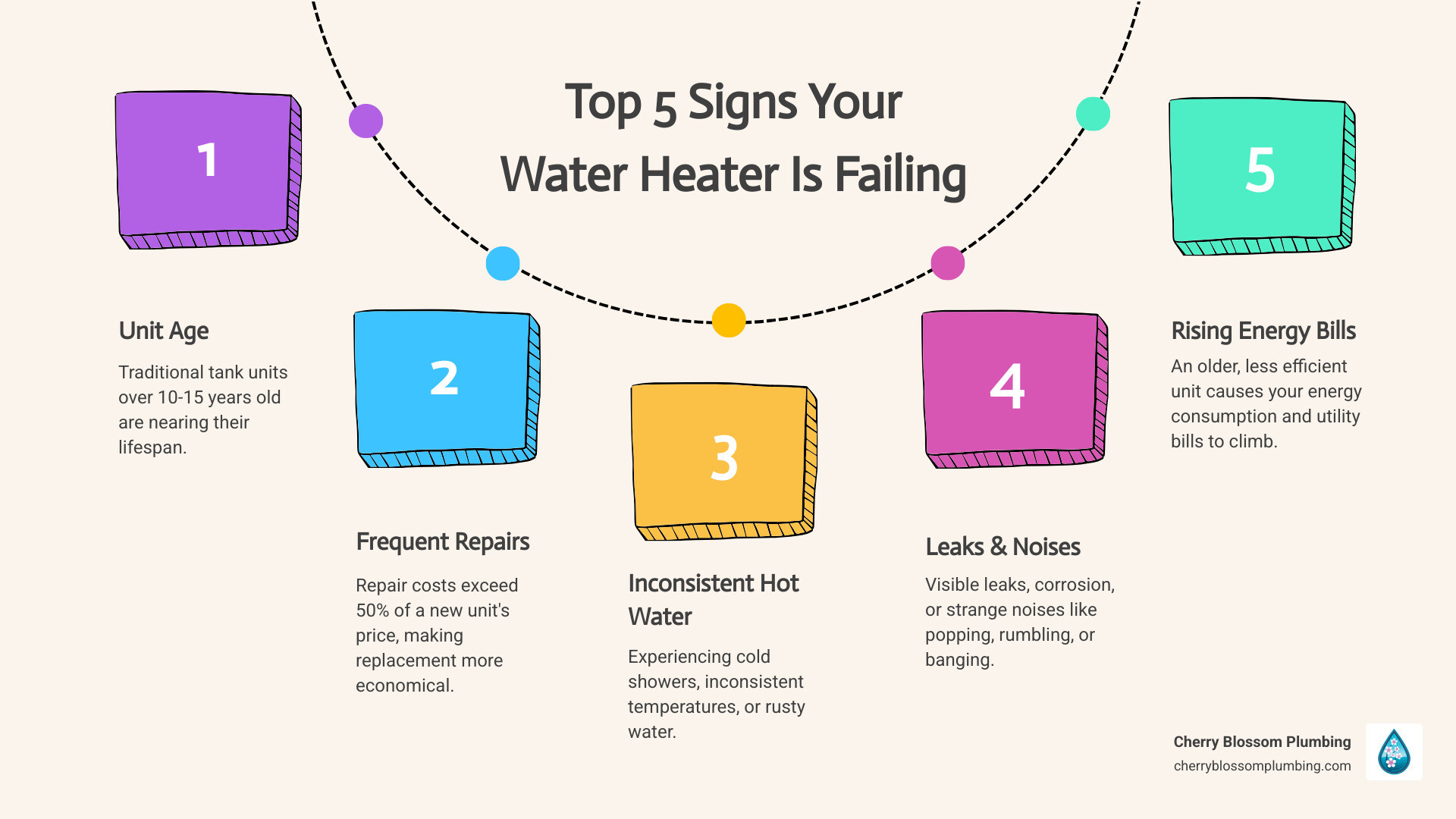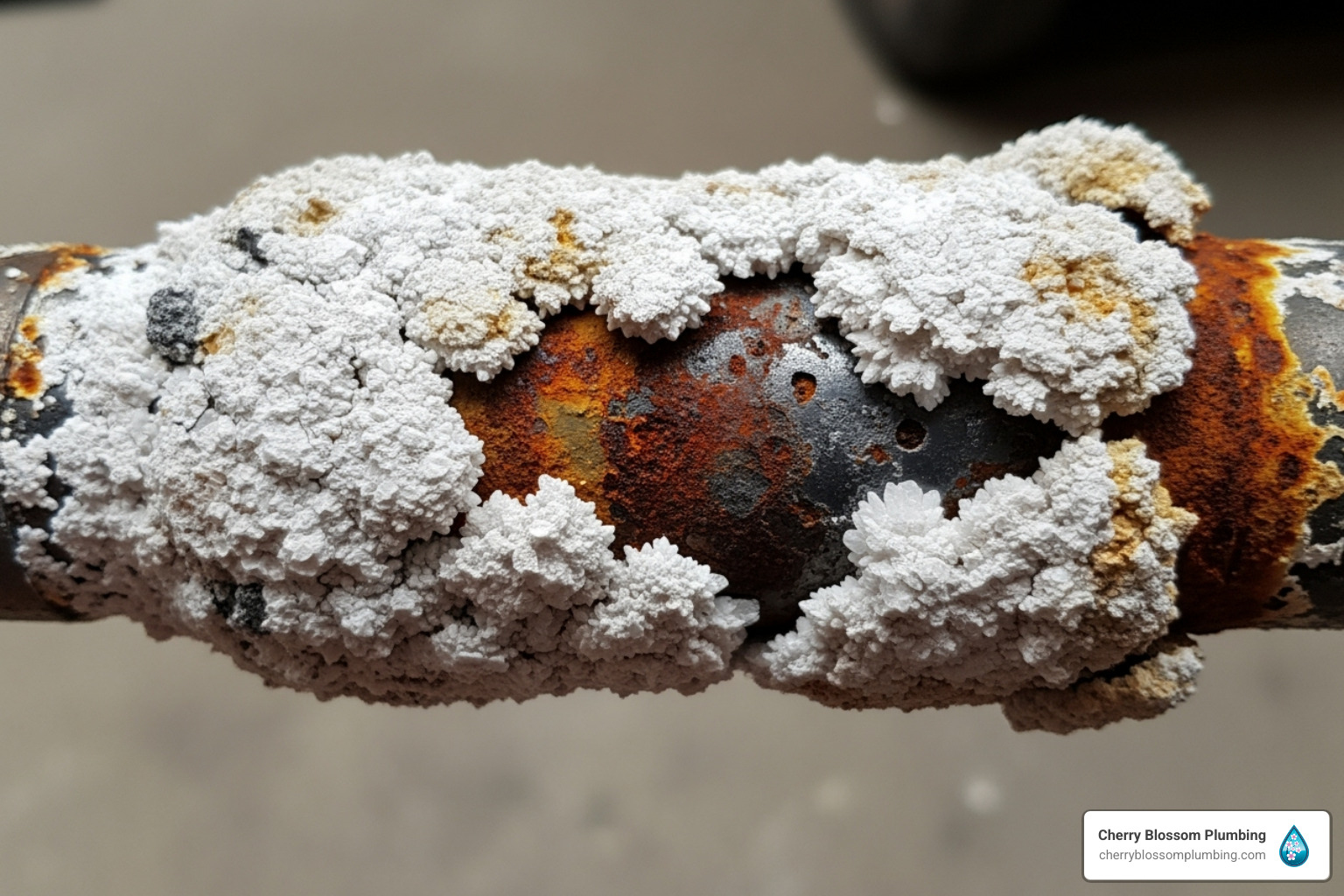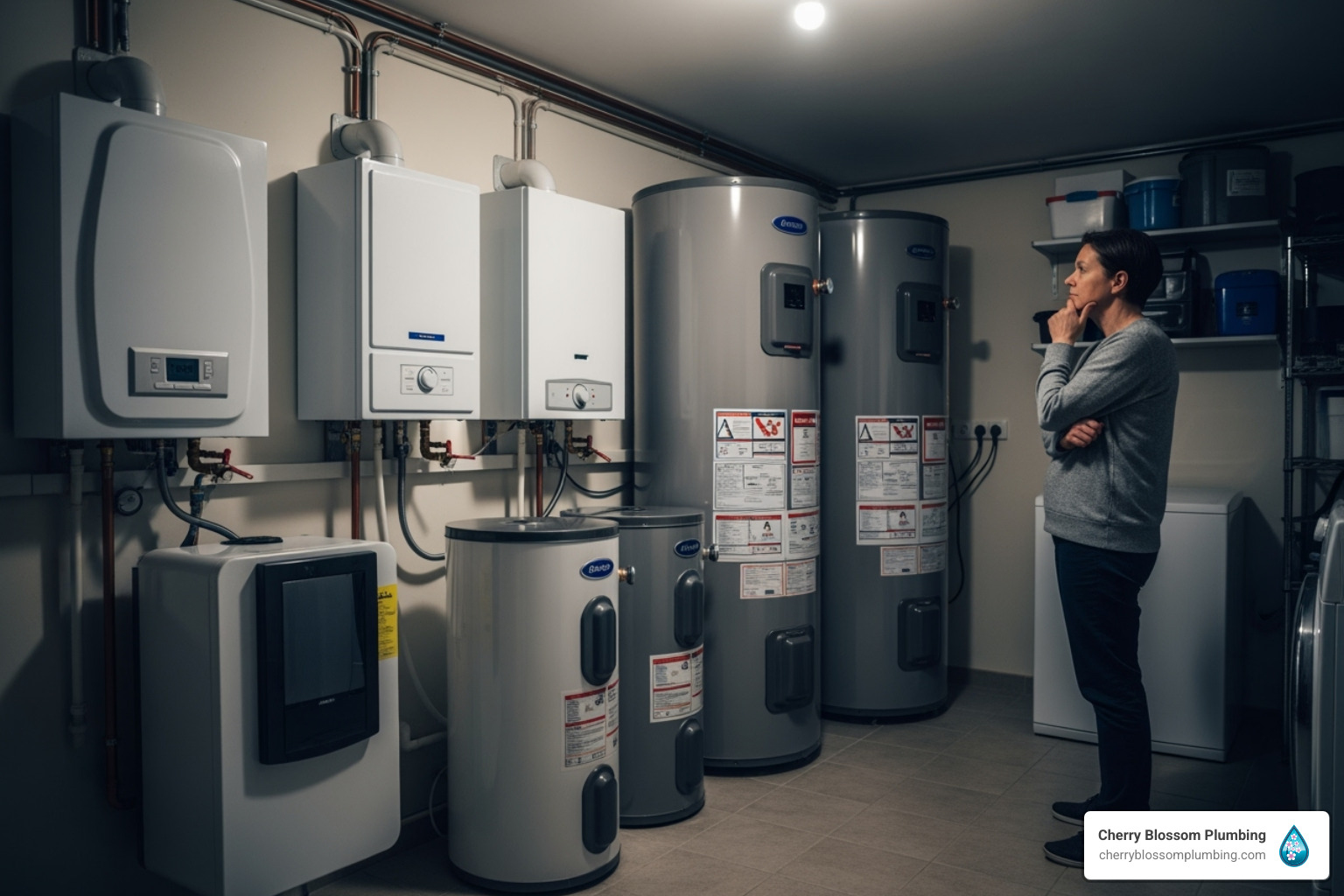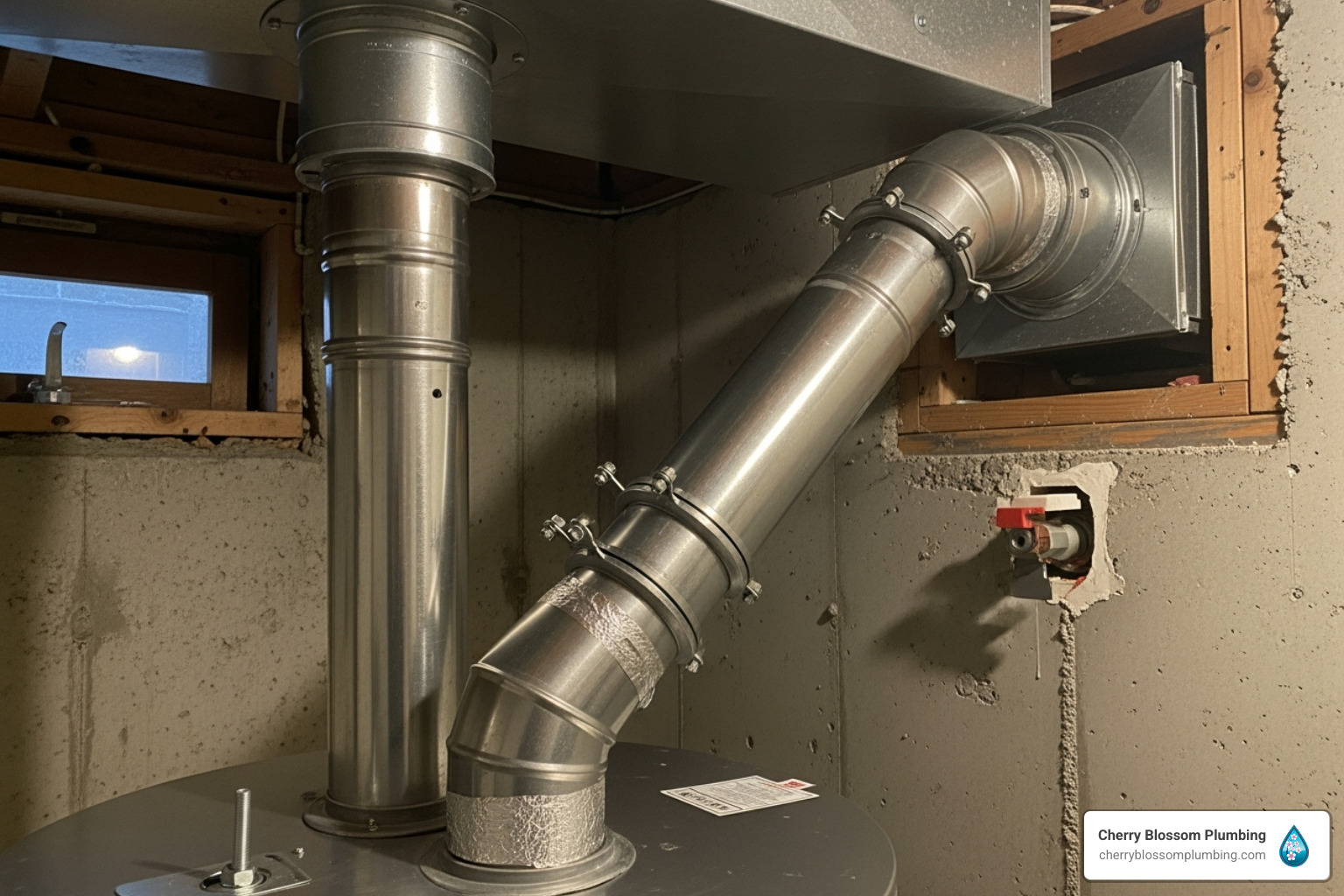Why Hot Water Heater Replacement is Critical for Your Home’s Comfort
A hot water heater replacement becomes essential when your unit fails, leaving you with cold showers and disrupting your daily routine. Most homeowners don’t think about their water heater until it stops working, but proactive replacement can save you from a cold surprise.
When you need hot water heater replacement:
- Age: The unit is over 10-15 years old (for traditional tanks).
- Frequent Repairs: Repair costs exceed 50% of a new unit’s price.
- Poor Performance: You experience inconsistent temperatures, rusty water, or insufficient hot water.
- Visible Issues: You see leaks, corrosion, or hear strange noises like popping or rumbling.
- High Energy Bills: Your utility costs are rising as the unit loses efficiency.
Water heating can account for up to 20% of your home’s energy use. A failing unit not only causes discomfort but also leads to higher utility bills and the risk of water damage from leaks. This guide covers everything you need to know about replacing your water heater, from spotting warning signs to choosing the right model and understanding the installation process.

Is It Time for a Replacement? Key Signs and Lifespan
By the time your water heater is obviously broken, you’re already dealing with cold showers and potential water damage. The smart move is to learn the warning signs before your unit fails completely.
Telltale Signs Your Water Heater is Failing
Your water heater provides clear signs when it’s beginning to fail. No hot water or inconsistent temperature is the most obvious cry for help. If your showers are suddenly turning cold, it’s time to investigate.
Leaks or puddles around the base of your water heater are a serious warning. Even a small amount of water can indicate internal corrosion, and a minor leak can quickly escalate into a flood, causing significant damage to your home.
Rusty water from your hot water taps is a clear sign that the inside of your tank is corroding. This internal rust will only worsen over time and eventually lead to a leak.
Strange noises like popping, rumbling, or banging are typically caused by sediment buildup at the bottom of the tank. This layer of mineral deposits forces the heating elements to work harder, reducing efficiency and causing stress on the unit.
For more details on these warning signs, check out our guide on Signs it’s Time for a Water Heater Replacement.
Understanding Water Heater Lifespan and the 50% Rule
Water heaters have a limited lifespan. Traditional tank water heaters typically last 10-15 years, while tankless water heaters can last 20 years or more.
To determine if a replacement is cost-effective, we use the 50% Rule: if a repair costs more than half the price of a new unit, replacement is the more financially sound option. You can find your water heater’s age by decoding the serial number on the manufacturer’s label using a guide like How to find your water heater’s age.
While regular maintenance, as detailed in our Water Heater Repair and Maintenance Tips, can extend its life, all units eventually need replacement.
Common Problems That Signal the End
Certain issues often signal that a replacement is imminent:
- Sediment Buildup: Minerals settle at the bottom of the tank, forcing the unit to work harder, reducing efficiency and capacity.
- Corrosion: Once the sacrificial anode rod is depleted, the tank itself begins to rust from the inside, leading to inevitable failure.
- Faulty Thermostat: A consistently malfunctioning thermostat can indicate that other components are also failing.
- Broken Heating Elements: In electric models, recurring failure of heating elements often points to a larger, age-related problem.
- Broken Dip Tube: This component failure allows cold and hot water to mix, resulting in lukewarm water even when the tank is full.
- High Peak Usage Issues: Sometimes, the unit isn’t broken but is simply too small to meet your family’s hot water demands.
When you’re dealing with these issues, our Reliable Hot Water Heater Repair team can give you an honest assessment. We’ll tell you whether a repair will actually solve your problem or if hot water heater replacement is the smarter investment for your home’s comfort and your wallet.
Choosing Your New Water Heater: A Homeowner’s Guide
Once you’ve decided it’s time for a hot water heater replacement, you’ll need to choose a new model that is reliable, efficient, and suited to your family’s needs. The key factors to consider are your fuel source (natural gas, propane, or electricity), energy efficiency ratings, and your household’s specific hot water needs.
Exploring the Types of Water Heaters
Conventional storage water heaters are a popular choice. These tanks store and heat 30-80 gallons of water, providing a ready supply. Available in gas, propane, or electric models, they offer reliable performance at an affordable upfront cost.
Tankless water heaters heat water on demand, providing an endless supply of hot water. This makes them highly energy-efficient, as they only operate when you need hot water. They also have a longer lifespan of 20+ years. Our guide on Choosing the Best Tankless Water Heater offers more details.
Heat pump water heaters are the most energy-efficient option. These hybrid units pull heat from the surrounding air to warm the water, which can reduce water heating costs by up to 60%. Although they have a higher upfront cost, they are often eligible for federal tax credits.
Solar-powered units use the sun’s energy to heat water, significantly reducing your carbon footprint. They usually require a backup system for cloudy days but can provide free hot water when it’s sunny.
Sizing Your Water Heater for Your Home’s Needs
Proper sizing is crucial for performance and efficiency. For traditional tank water heaters, we consider the First Hour Rating (FHR), which indicates how much hot water the unit can produce in an hour. Sizing is based on household size, number of bathrooms, and peak demand. A family of four, for example, typically needs a 50-60 gallon tank.
For tankless water heaters, we calculate the required Gallons Per Minute (GPM) to ensure the unit can support simultaneous use of multiple fixtures, like a shower and a dishwasher. Our team assesses your specific needs to recommend the perfect size during your consultation for an Efficient Hot Water Heater Installation.
To Buy or To Rent? A Long-Term Financial Breakdown
Homeowners often ask whether to buy or rent a new water heater. While renting offers low upfront costs and included maintenance, buying is typically the better long-term investment.
When you buy, you own the asset and your only ongoing costs are for energy and occasional maintenance, leading to significant long-term savings. Renting can be a good option for those planning to move soon or who prefer a predictable monthly payment that covers repairs.
However, for most homeowners, purchasing is more cost-effective. Industry data shows that buying can save a homeowner around $1,846 over 10 years compared to renting. We provide a transparent breakdown to help you decide what’s best for your budget.
The Professional Hot Water Heater Replacement Process
A hot water heater replacement is a complex job involving gas lines, high-voltage electrical connections, and plumbing. It’s not a DIY project. Professional installation is essential for your family’s safety, your home’s protection, and to ensure the unit operates correctly and efficiently.
What to Expect During a Professional Hot Water Heater Replacement
Our professional hot water heater replacement process is designed to be smooth and stress-free. Here’s what you can expect:
- Preparation: We confirm the new unit is correct for your home, inspect the installation area, and protect your floors with drop cloths.
- Draining and Disconnecting: For safety, we shut off the water, gas, and/or power. We then drain the old tank and carefully disconnect all water, gas, and electrical lines.
- Removal and Disposal: We remove the heavy old unit and ensure it is disposed of according to local environmental regulations.
- New Unit Placement: We position the new water heater, ensuring it is level and has proper clearance for ventilation and maintenance. Tankless units are securely mounted to the wall.
- Connections: Our experts connect the new unit’s water, gas, and electrical lines, adhering to all safety codes. This includes installing any necessary upgrades like expansion tanks or new venting.
- Testing and Final Checks: We fill the new tank, check for leaks, and restore power. We test the unit’s operation, including the temperature and pressure relief valve, to ensure everything works perfectly.
Finally, we’ll explain your new system’s operation and clean up the work area completely. Our process follows detailed Hot Water Heater Installation Steps to guarantee a quality job.
Understanding Costs and Potential Savings
The cost of a hot water heater replacement depends on several factors, including installation complexity. A simple tank-for-tank swap is more affordable than a tank-to-tankless conversion, which may require new plumbing, electrical, or venting work.
However, the long-term savings from a new, efficient unit are significant. Upgrading to an ENERGY STAR certified model can lead to substantial energy efficiency benefits. For instance, an ENERGY STAR heat pump water heater can save a family of four over $330 annually, totaling more than $3,530 over its lifespan.
Furthermore, government incentives can lower the initial cost. Federal tax credits of up to $2,000 are available for qualifying heat pump water heaters through 2032. An efficient water heater is an investment that pays for itself through lower utility bills. You can learn about energy-efficient models to explore your options.
The Dangers of DIY Installation
While DIY projects can save money, a hot water heater replacement is a job best left to professionals. The risks of DIY installation are severe and include:
- Gas Leaks: Improperly connected gas lines can lead to dangerous and potentially explosive leaks.
- Carbon Monoxide Poisoning: Incorrect venting of a gas heater can trap this deadly, odorless gas inside your home.
- Electrical Hazards: Working with 240-volt connections is extremely dangerous and can cause electrocution or fires.
- Water Damage: A single incorrect plumbing connection can cause a major leak, leading to thousands of dollars in damage.
- Voided Warranty: Most manufacturers require professional installation to validate the warranty.
- Code Violations: Non-compliant work can cause issues when selling your home and may require costly rework.
Our licensed professionals at Cherry Blossom Plumbing have the expertise to install your unit safely and correctly. Learn more about our Water Heater Installation Services and why professional installation is the only safe choice.
Extending the Life of Your New Water Heater
Congratulations on your new hot water heater replacement! To protect your investment and ensure it lasts for years, simple preventative care is key. Regular upkeep helps your water heater run efficiently, extends its lifespan, and prevents unexpected failures.
Essential Maintenance Tips
Here are the essential maintenance tasks we recommend:
- Annual Tank Flushing: For tank-style heaters, flushing the tank annually is the most important task. It removes sediment buildup that reduces efficiency and can cause damage.
- Checking the Anode Rod: This rod protects your tank from corrosion and should be inspected every few years, especially if you have hard water. A depleted rod must be replaced to prevent tank rust.
- Testing the T&P Valve: The Temperature and Pressure relief valve is a critical safety feature. Test it annually by lifting the lever to ensure water flows out and stops when released. If it malfunctions, replace it immediately.
- Adjusting the Thermostat to 120°F: This temperature is energy-efficient, reduces mineral buildup, and minimizes the risk of scalding.
Tankless systems have different maintenance needs, which are detailed in our guide on Maintenance for Tankless Water Heaters.
Regular upkeep maximizes your return on investment by improving efficiency and longevity. For professional help, explore our Water Heater Maintenance services.
Frequently Asked Questions about Water Heater Replacement
We love chatting with homeowners about hot water heater replacement. Here are answers to the questions we hear most often from Arlington and Falls Church families.
How long does a hot water heater replacement take?
A standard tank-to-tank replacement typically takes 2-4 hours. Upgrading to a tankless water heater is more involved and usually takes 4-8 hours, as it may require new gas lines, electrical wiring, or venting. The exact time can vary based on the unit’s location and any necessary plumbing modifications.
Do I need a permit for a water heater replacement in Arlington, VA?
Yes, a permit is required for a hot water heater replacement in Arlington, VA. This ensures the installation complies with all local safety and building codes, protecting you and your home. As your professional installer, we handle the entire permit and inspection process for you, so you don’t have to worry about the paperwork or scheduling.
What are the benefits of upgrading to a tankless water heater?
Upgrading to a tankless water heater during your hot water heater replacement offers several key advantages:
- Endless Hot Water: Since water is heated on demand, you never run out.
- Energy Savings: Tankless units can be up to 30% more efficient than storage tanks because they don’t constantly heat stored water.
- Longer Lifespan: They typically last 20+ years, compared to 10-15 years for traditional tanks.
- Space-Saving Design: Their compact, wall-mounted design frees up floor space.
These features make tankless models a great long-term investment. Learn more in our guide to the Benefits of Tankless Water Heaters.
Conclusion: Ensure Your Home’s Comfort with a Reliable Water Heater
Your water heater is essential for daily comfort, from hot showers to clean dishes. When it fails, it disrupts your entire household. This guide has equipped you with the knowledge to recognize warning signs, choose the right replacement, and understand the importance of professional installation for your hot water heater replacement.
Investing in a new, efficient water heater improves your home’s comfort, lowers energy bills, and provides peace of mind. Modern options like tankless and heat pump models offer significant long-term savings and may qualify for tax credits. The key is to be proactive and replace your unit before it fails completely, avoiding emergency calls and potential water damage.
At Cherry Blossom Plumbing, we make the hot water heater replacement process simple and stress-free. As a family-owned, licensed plumbing service for Arlington and Falls Church, VA, we provide fast, reliable, and honest work backed by our “WOW factor” guarantee. Our expert team will help you select the right unit and handle the entire installation, including all permits and inspections, ensuring it meets all safety codes.
Don’t wait for a cold shower to ruin your morning. Schedule your professional water heater replacement in Arlington, VA today! Let us restore reliable hot water to your home so you have one less thing to worry about.



